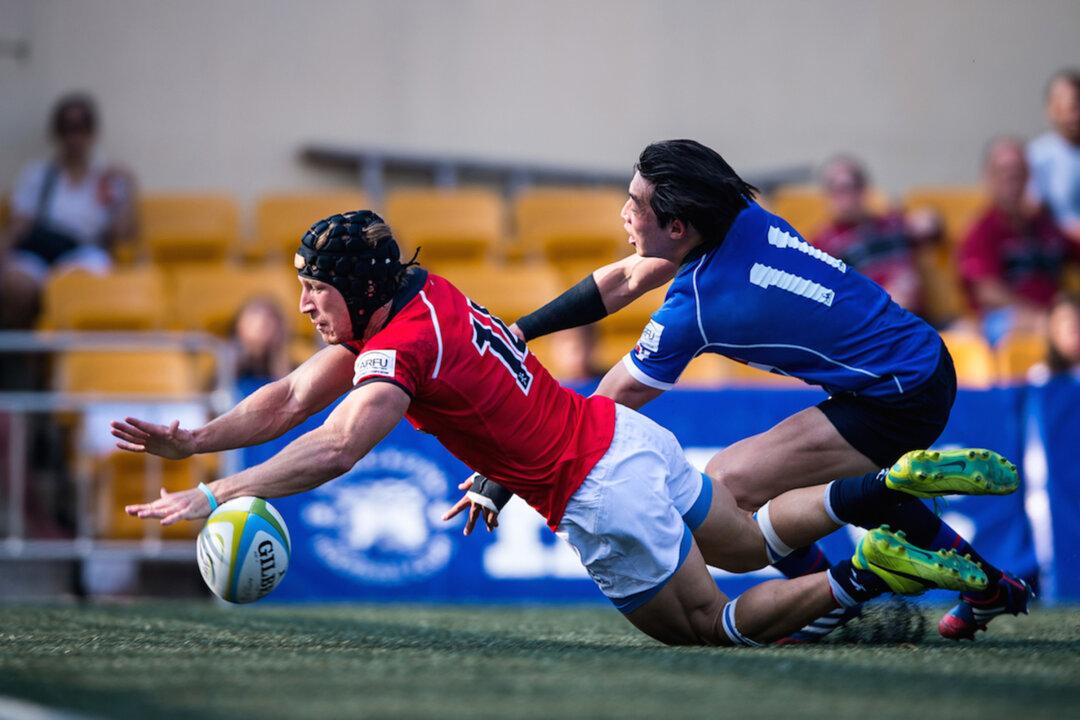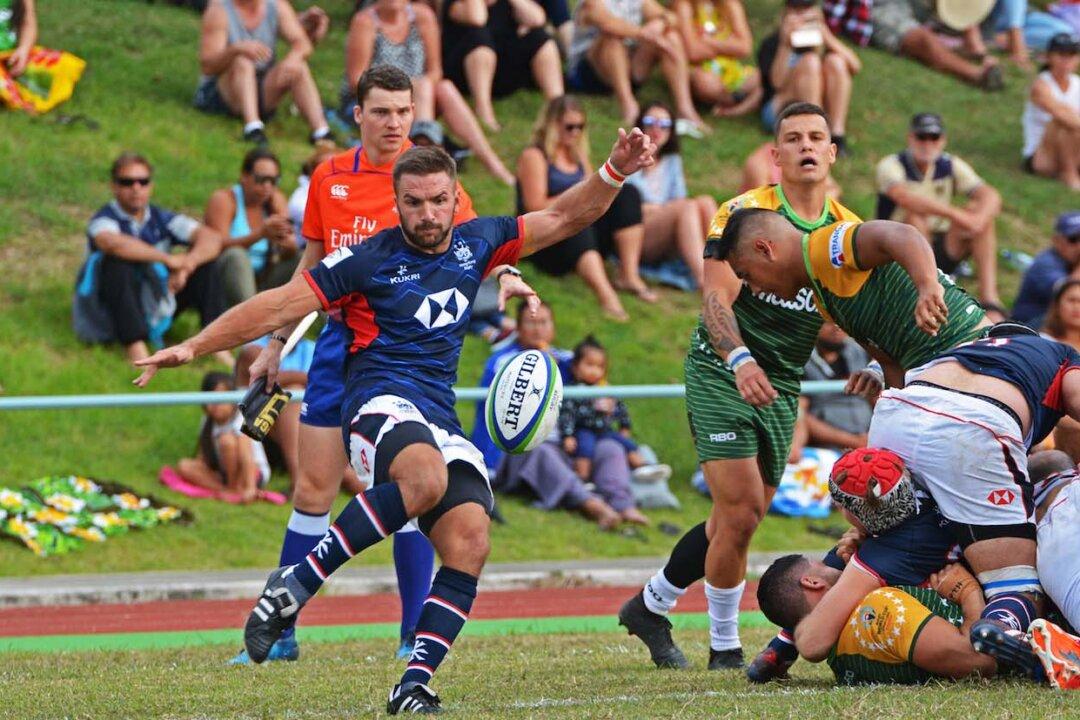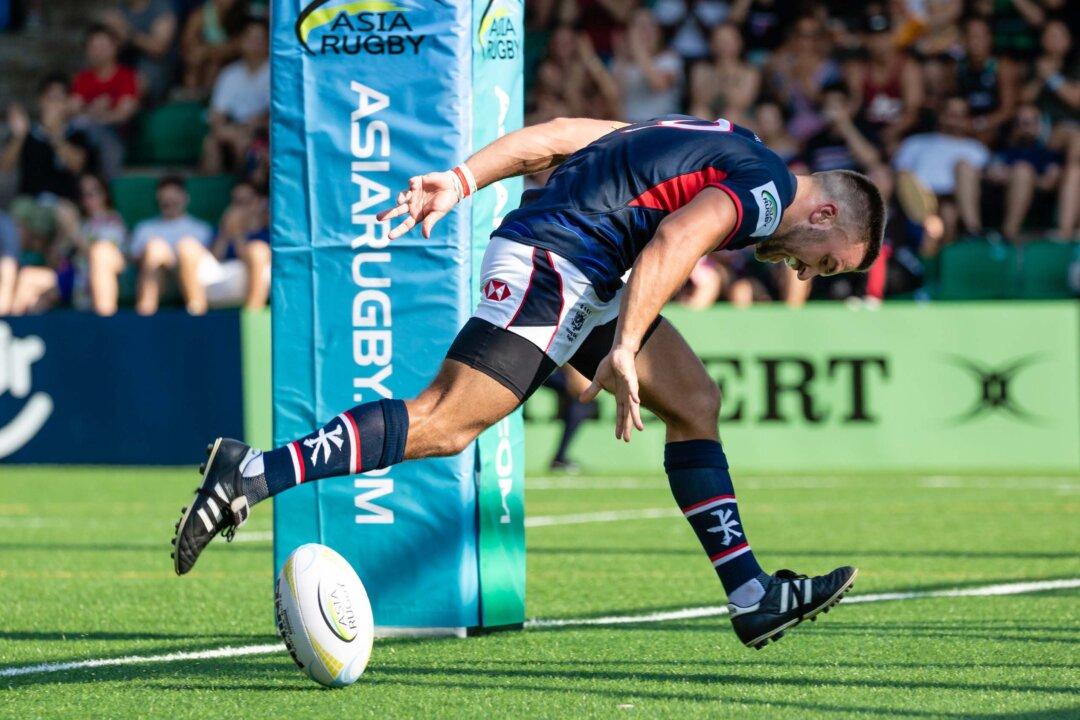Hong Kong lost their opening match of the Asia Rugby Championship against South Korea, 26-33 on Saturday April 25, in front of a subdued Hong Kong crowd, even the Dragon mascot had a quiet game around the terraces! This was the second match of the top tier games in Asia: Korea lost to Japan 30-56, in the opening game last week in South Korea. This season, the elite division is only three teams, playing home and away. A home defeat for Hong Kong is a tough start to the competition. Victory for Korea away from home, against Hong Kong, is a very satisfying result.
Korea were worthy winners. It was always going to be tough match for both sides, but Korea came out of the blocks faster and harder than Hong Kong, leaving the hosts trailing in their wake for the entire match. Hong Kong had to chase the game playing catch-up rugby.
Within the first minute, the Korean intent was made clear. Hong Kong kicked off, Korea immediately contested the ball and took play into the Hong Kong 22. Defence to attack in 60 seconds. And after 5 minutes, the impressive Korean fullback Seong Min Jang ran in the first try, with quick skilful handling in the Korean backline, which left Hong Kong grasping at air, with the speed of both the hands and legs of the Korean backline.
Hong Kong missed a kickable penalty on 9 minutes: and then found themselves 0-12 down, after another impressive running and handling display by Korea, with a try by the right winger Bin Jegal who outstripped the Hong Kong defence.
Tom McQueen got Hong Kong on the scoreboard with some quick thinking, by taking a kick and chase penalty, and just managed to touch down. The try was converted and it was 7-12 after 20 minutes. The score boosted Hong Kong’s match confidence, but any thought of closing the gap, was quickly squashed. Korea ran in another excellent try by Bin Jegal, who was simply too quick for Salom Yiu. The try was unconverted and the score, 7-17.
The Korean dominance continued, and they frustrated Hong Kong at the breakdown, and in contesting for the ball. There was a further penalty to Korea, successfully converted. And just before halftime, after pressuring the Hong Kong line, Korea eventually scored through the fullback Seong Min Jang, his second of the match.
The half time score was 7-25: Hong Kong had been out played, by a Korean team who were proving faster and more skilful than their opponents. They were quicker to the breakdown, faster at recycling the ball, and capable to break the Hong Kong gain line, and move the ball at speed.
The second half did not begin well for Hong Kong. A penalty moved the score out to 7-28.
But Hong Kong’s endeavour was beginning to pay. Korea had a forward sin-binned, and then the Hong Kong pack rumbled to the Korean line and John Aikman burrowed over for a try. It was a much needed reward for the hard graft by the Hong Kong pack. The try was converted, and score stood at 14-28.
Some momentum was starting to appear in the Hong Kong game, but Hong Kong could not convert pressure into points. At this level when teams get into the 22 for sustained periods of time, they must keep the score board ticking.
Korea intercepted Hong Kong ball, broke down field, but Hong Kong covered well, then lost turnover ball, and despite an obvious forward pass, the Korean winger, Yong Heung Chang, cut through the Hong Kong defence and just managed to squeeze over the line, putting the score out to 14-33.
Entering the last quarter of the match, the fitness of the Hong Kong team began to show. The impressive Tom McQueen, who was always looking for the ball, again made a break, and only a tip tackle denied him a clear run for the line. The gain in territory provided a platform for Alex McQueen to race in for a try. It was 19-33 with 20 minutes to play. Hong Kong in the ascendancy, and Korea beginning to tire.
Again, Hong Kong pressure did not yield points. Despite repeated Korean infringements that should have led to either a yellow card or penalty try, the Korean line defence held firm. Eventually Niall Rowark created space for Salom Yiu, with a long drift pass, and the winger touched down. The try was converted and the score stood at 26-33, with only 5 minutes to play.
Despite having more possession, Hong Kong could not keep the ball for long enough to pressure the Korean line. A final penalty saw Korea kick the ball into touch to celebrate a deserved victory.
Man of the match, if there was such an award, may well have gone to the Korean fullback, Seong min Jang. His powerful running, especially in the first half, when he joined the line created problems for Hong Kong. He scored twice and was instrumental in all the Korean scores, and proved a handful for Hong Kong to deal with.
And moment of the match: the Korean try after 5 minutes. It set the tone for the game. Korea had come to play a running game of rugby at pace, using their impressive backline and the power of their pack to ensure Hong Kong had to chase the game, on the pitch and the scoreboard. They may have run out of energy towards the end, but the platform had been set, and by the end of the first half only one team looked like they would win the match.
Hong Kong will be disappointed, although pleased to have won two bonus points by scoring four tries and losing by seven points or less. But they came up against an impressive Korean side. The Hong Kong pack held their own, and did well in creating momentum to get the team back into the match. However, the backline, looked drilled for defence not attack. Only Tom McQueen looked as though he wanted to take the game to Korea. Playing this kind of competitive rugby is what Hong Kong needs. Although the result is disappointing, the future is not. This is just the kind of rugby that needs to be played more often.
Next week, Korea rest, and Hong Kong play Japan. While victory might be a step too far for Hong Kong, they will be less ring rusty, a tad sharper and more match aware, than they were this week. The more games of this stature they play: the better the fifteen-a-side game will become. If the ambition is 2019, there’s much to be done. The hard work starts now.
Grahame Carder is a sports enthusiast and ?former player from representative Schoolboy level, through University and most corners where he’s lived. Currently works as Consultant on Strategy and Marketing.




